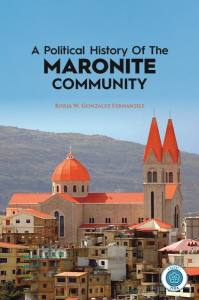Tai'fah Or Nation? a Political History of the Lebanse Maronite Community

Going beyond the scripturalistic and even archaeological penchant so ubiquitous in Oriental Christian Studies, this book’s focus on the present will try to dispel the dominant historiographical account that portrays the Maronite community as the hegemon in pre-war Lebanon16 to underline, on the contrary, how the community participated, on an equal footing with the other major Lebanese tawa’if, in the game of “corporate federalism”17, in the consociational arrangement that characterized what Michel Chiha defined as the country of “associated confessional minorities”18. In fact, it will be argued that the bitter internal rivalries plaguing Maronite leadership, in both clerical and lay circles, throughout our study period19 – and beyond, as witnessed by the only recently overcome conflict between General cAun and Samir Geagea – prevented the community from taking full advantage of the constitutional prerogatives formally attributed to its main representative in the political game, the President of the Republic20. Forced to compromise, the Maronite community participated, as will be explained below, in the development of an unwritten constitutional tradition21 that, breaking away from the rigid legal positivism enshrined by Kelsen and his followers22, consecrated a power-sharing decision-making system which, under the catchy name of National Pact, severely curtailed presidential authority23 and established a double-veto arrangement24 at the helm of the State.
-
Kategori
Üniversite Yayınları
-
Konu
Din
- Yazarlar
- Yayınevi
İçeriğe ait içindekiler bölümünün aktarımı devam etmektedir.
Bu kitap aşağıdaki Dijital Hak Yönetimi (DRM) Koşullarıyla belirlenen süre için kullanılabilmektedir:
-
Yazıcıdan Çıktı Alma İzni:
Yok
-
Kes/Kopyala/Yapıştır:
Yok
-
Toplam Kullanılabilecek Cihaz Adedi:
2
-
Kitap Dosyasını Farklı Kaydetme ve Dijital Ortamda Çoğaltma İzni:
Yok
Değerli kullanıcımız, indirmek istediğiniz kaynak 5846 sayılı Fikir ve Sanat Eserleri kanunu kapsamında kullandırılmakta olup, telif hakları doğrultusunda 3 gün süreyle şifreli olarak indirilecektir. Süreniz dolduğunda ilgili kaynağa çevrimdışı erişim hakkınız bitecektir. Bu kapsamda kaynağı indirmeye devam etmek ister misiniz?
İndirdiğiniz kaynağı görüntülemek için yönergeyi takip ediniz
 Kavram Atlası Siyer II
Kavram Atlası Siyer II
 Nübüvvet Çağdaş Bir Yaklaşım
Nübüvvet Çağdaş Bir Yaklaşım
 Göze Hoş Gelene Değer Biçilmez: Ebu İnan'ın Gözdesi Fes Ebu İnaniye Medresesi
Göze Hoş Gelene Değer Biçilmez: Ebu İnan'ın Gözdesi Fes Ebu İnaniye Medresesi
 Kavram Atlası Tasavvuf II
Kavram Atlası Tasavvuf II
 Kavram Atlası İslam Hukuku I
Kavram Atlası İslam Hukuku I
 Yahudilikte Öteki Bir Şeytanlaştırma Sürecinin Teo-Politiği
Yahudilikte Öteki Bir Şeytanlaştırma Sürecinin Teo-Politiği
 Ey İslam Ümmeti Gidişat Nereye
Ey İslam Ümmeti Gidişat Nereye
 İbâzi Fıkhı / Dört Mezheple Mukayese (İbâdât)
İbâzi Fıkhı / Dört Mezheple Mukayese (İbâdât)
 İstibdat (Ötekileştirilenlerin Tarihi)
İstibdat (Ötekileştirilenlerin Tarihi)
 Müsned: İbâziyye'nin Temel Hadis Kaynağı (İbazi Serisi 1)
Müsned: İbâziyye'nin Temel Hadis Kaynağı (İbazi Serisi 1)
 Din Öğretiminde Alternatif Ölçme Ve Değerlendirme
Din Öğretiminde Alternatif Ölçme Ve Değerlendirme
 Resail Mektuplar (İbazi Serisi 2)
Resail Mektuplar (İbazi Serisi 2)